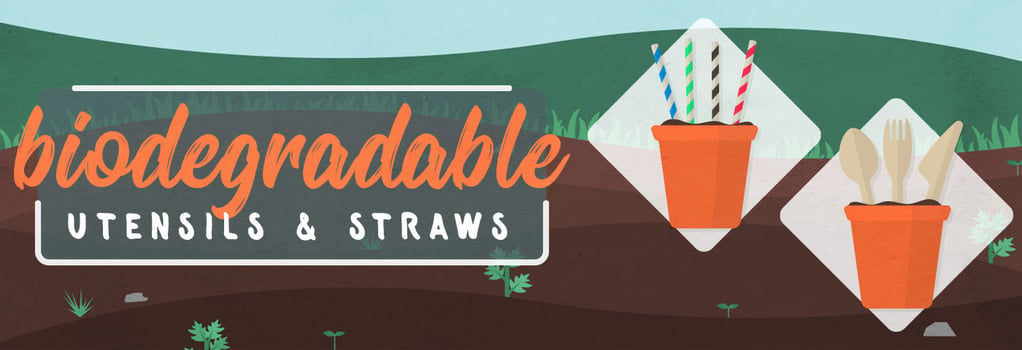
Best Biodegradable Utensils & Alternatives to Plastic Straws
Restaurants these days rely more heavily on single-use utensils, and not just for to-go orders. Plastic cutlery1 and other disposable dining supplies are the norm in many locations with open dining rooms, a practice that aligns with CDC recommendations2 to use disposable tableware.
This operational change is at odds with an ongoing environmentally conscious push to eliminate the use of plastic straws that, by 2018, had already ushered in city-wide bans across the country and calls for biodegradable alternatives. Two years later, in the midst of an unprecedented pandemic that devastated the foodservice industry and caused a shift in focus to carryout and delivery operations, phasing out disposable utensils and straws no longer seems realistic – at least for now.
Here's the good news: In an effort to meet demand for eco-friendly products and keep up with evolving industry trends, many manufacturers already offer a robust catalogue of alternatives to plastic utensils and straws that go way beyond paper.
Biodegradable Utensils & Straws for Restaurants & Bars
Below, you can learn more about the types of biodegradable utensils and straws currently available and decide which are best for your operation. Whether you run a restaurant with patio dining, a full-service concept focusing on carryout and delivery, or a sustainability-minded mobile eatery, switching to these products can lessen the plastic waste generated by single-use utensils.
Wooden Cutlery
If you've ever wandered into a gelato or ice cream shop, you're familiar with the small spoons offered alongside those orders, but those aren't the only wooden cutlery options for foodservice operations. Most often made of pinewood (a softwood that's long been used in manufacturing) or bamboo (a type of grass, not wood, that's become a popular manufacturing material because it's renewable), these lightweight utensils are biodegradable and compostable, which should check the "more eco-friendly than plastic" box for most operators.
Although there's not a wide variety of materials to choose from here, you do have flexibility in what style you add to your operation and how many you buy at once.
The Servewise collection by Front of the House offers utensils made of pinewood and poplar.
Biodegradable utensils from Tablecraft also include a set (without a napkin), and individual forks, knives, and spoons sold in packs of 25 or 100. If bamboo is your preferred material, Tablecraft's disposable bamboo forks are also sold in packs of 100.
As far as overall lengths go, you'll find a spork measuring 31⁄4 inches and "mini" forks and spoons measuring 33⁄4 inches, but most of these plastic cutlery alternatives fall between 5 and 61⁄2 inches.
Alternatives to Plastic Straws
Metal straws – which were becoming more popular in the pre-pandemic world – aren't disposable, so we won't spend time talking about them here. When it comes to finding a biodegradable solution to plastic straws for your establishment, you basically have two options: paper straws and PLA straws.
The first alternative to plastic straws that gained traction, paper straws can be hit or miss with consumers who are worried they feel weird or get soggy if they sit in a drink for too long. However, paper straws developed for commercial use are designed to resist these issues so they can be successfully implemented in foodservice businesses. These are available in classic white and black and in striped designs, offering a pop of color that PLA straws cannot.
PLA is short for polylactic acid, which is technically a different type of plastic. Unlike the plastic straws you're used to, PLA straws are made from sugar cane or another renewable resource and are able to naturally degrade over time once discarded, which earns them a spot in this "eco-friendly alternative" roundup.
As with most other products, one size doesn't fit all, so you can choose from several straw lengths: 51⁄2, 53⁄4, 73⁄4, or 10 inches. These are also sold wrapped or unwrapped in packs of 300, 500, and 1,000.
Resources
- Hide the silverware: Plastic forks rule as restaurants reopen. Debra Kahn. Politico. Accessed June 2020.
- Considerations for Restaurant and Bar Operators. Centers for Disease Control and Prevention. Accessed September 2023.

